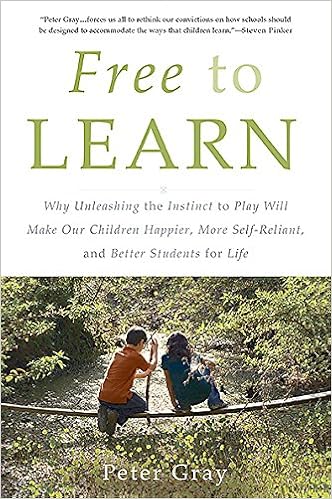Free to Learn by Peter Gray
Chapter 7 - The Playful State of Mind
Peter Gray, in defining play, writes that play is more about motivation and attitude rather than a behavior. and its not a specific characteristic but a mix of several characteristics. These are the five characteristics to describe true and actual play.
Play is self chosen and self directed. Here I think we often may fall short when providing play experiences. In play, the children (or adults) have the freedom to choose all aspects of the experience. They choose what to do or not do. They choose when it begins and when it is done. If adults control it, it's not play. If children must participate, it's not play. If they can't choose to quit, it's not play. Often experiences are offered under the guise of play - but if the child isn't calling the shots (including the option to call it quits or ignore it altogether), it's really not play.
Play is motivated by means more than ends. "Play is an activity conducted for its own sake." If there's a required outcome, then it's not play. Kids may have goals while playing ("I'm going to build a hospital.") but this goal is subordinate to the actual doing. The real goal is the enjoyment of doing the activity not having the hospital or whatever at the end. "It is possible to ruin play by focusing attention too strongly on rewards or outcomes." The final result or a reward for completing the action cannot be the main reason/focus for doing it. When I read this, I wondered about the common practice now of posting outcomes and standards goals. If we stress "this is what we are learning" too much, does that take any enjoyment out of doing it? Are we converting everything to work?
Play is guided by mental rules. All play has a structure; self-imposed rules and parameters guide play. Kids exercise self-control and restraint when playing. They follow whatever the rules (formal or informal) have been established. The rules are modified from time to time, but all players must agree to the changes. As I've read in other books, these rules help a child begin to understand and become a part of society.
Play is imaginative. Play consists of real people and real props, but somehow exists outside the real world. This characteristic is most obvious in socio-dramatic play but is present in other play, too. "Through play the child learns to take charge of the world and not simply respond passively to it." This aspect of play can help develop abstract thinking, creativity, hypothetical speculation, and logical reasoning. Yet, often play is minimal in school, the place where this type of thinking needs to take place.
Play is conducted in an alert, active, but non-stressed frame of mind. Play requires active thinking not just passively responding to stimuli. Players focus on the process and have no real fear of failure. They risk. They have no stress of evaluation or condemnation. Mistakes are a part of the process. (Not really an atmosphere in most schools now.) Play is powerful because it is trivial; it is fun. Kids have the freedom to try impossible things with not judgments.
"When children are free to play, they play naturally at the ever-advancing edges of their mental or physical abilities." As they repeat an activity, they adjust slightly, gaining more information about what they are doing. They may repeat something exactly to master a skill. But usually there is a systematic adjustment of the action to explore it further. And when there is nothing left to learn or explore, children will move on to do something else.
I've been challenged by this chapter. It comes at a time when I've been growing increasingly in my thinking about the learning environment. I look for ways to say yes. I step back and follow the child's lead. I let them follow their own ideas and make choices. I welcome the times they choose not to do something. So maybe I'm allowing enough play to go on.
Just recently I took a box of cars to leave in my classroom. Because of my situation, many of my "extra" resources, i.e. the ones we're not using, stay at my home. But I have a boy that enjoys using the cars in the blocks center. He asks from time to time and I'll bring them the next time (if I remember). So now, I keep some cars in the room at all times. This week, when he asked, I was able to pull them out for him to use. Will this happen every week? I don't know. But now we have some available for when they are needed.
This chapter was a high point in this book for me. I like when I have ideas confirmed. I like when I have ideas expanded. And I like when I have ideas challenged. This chapter did all three for me.



